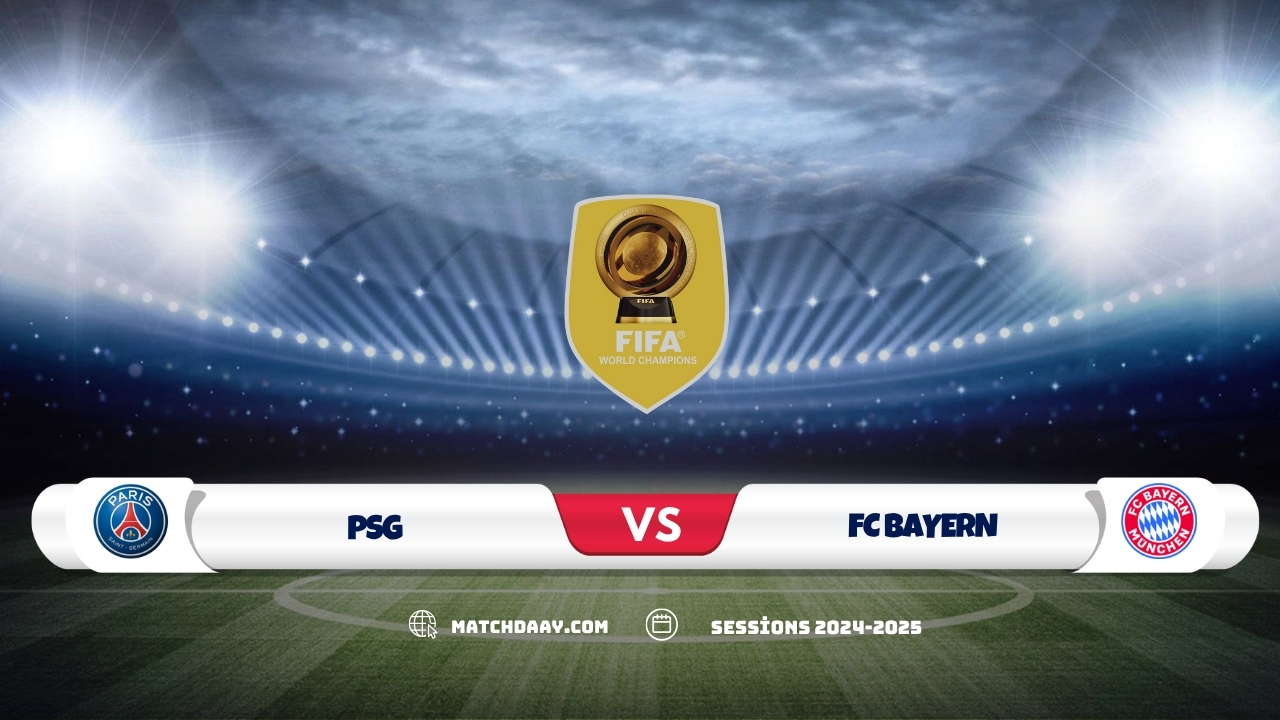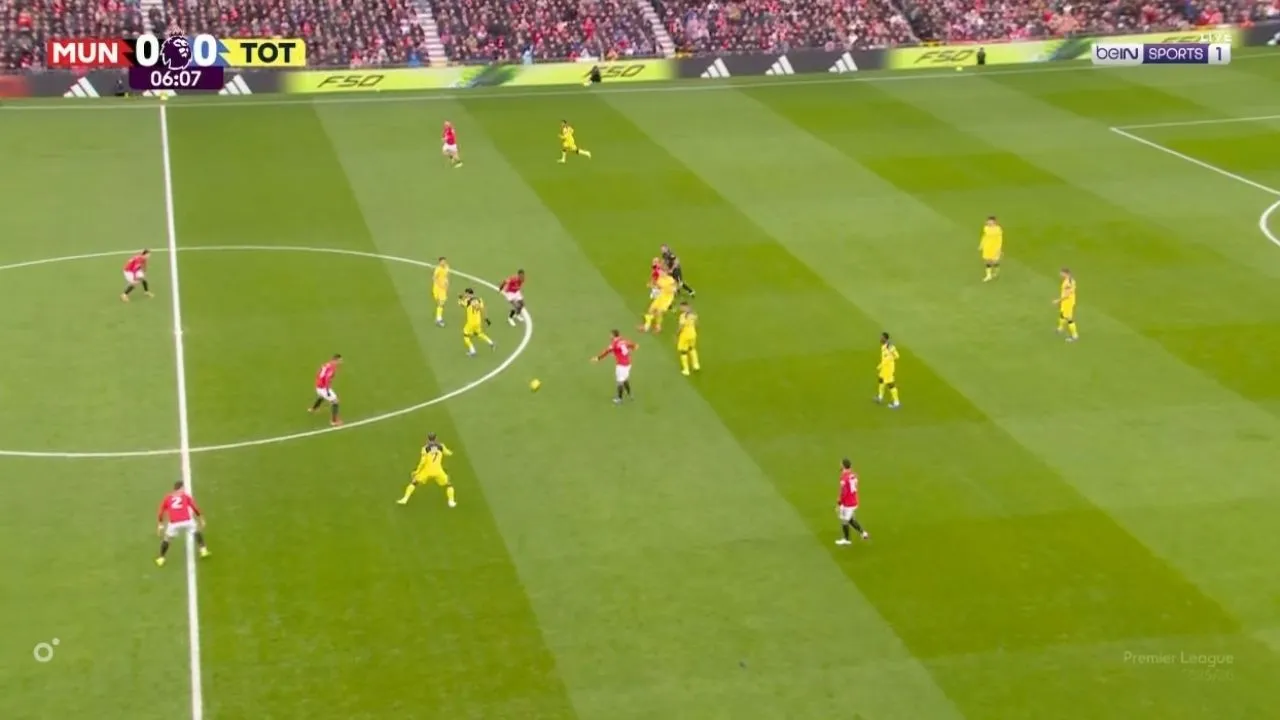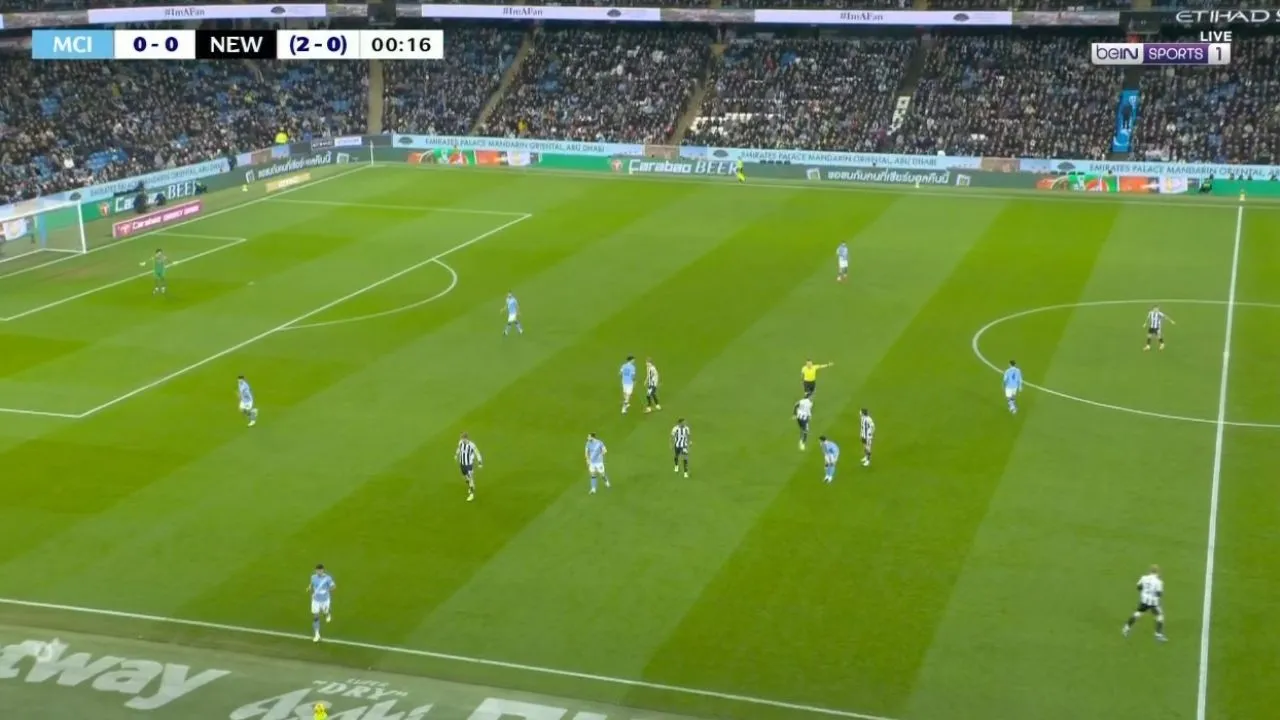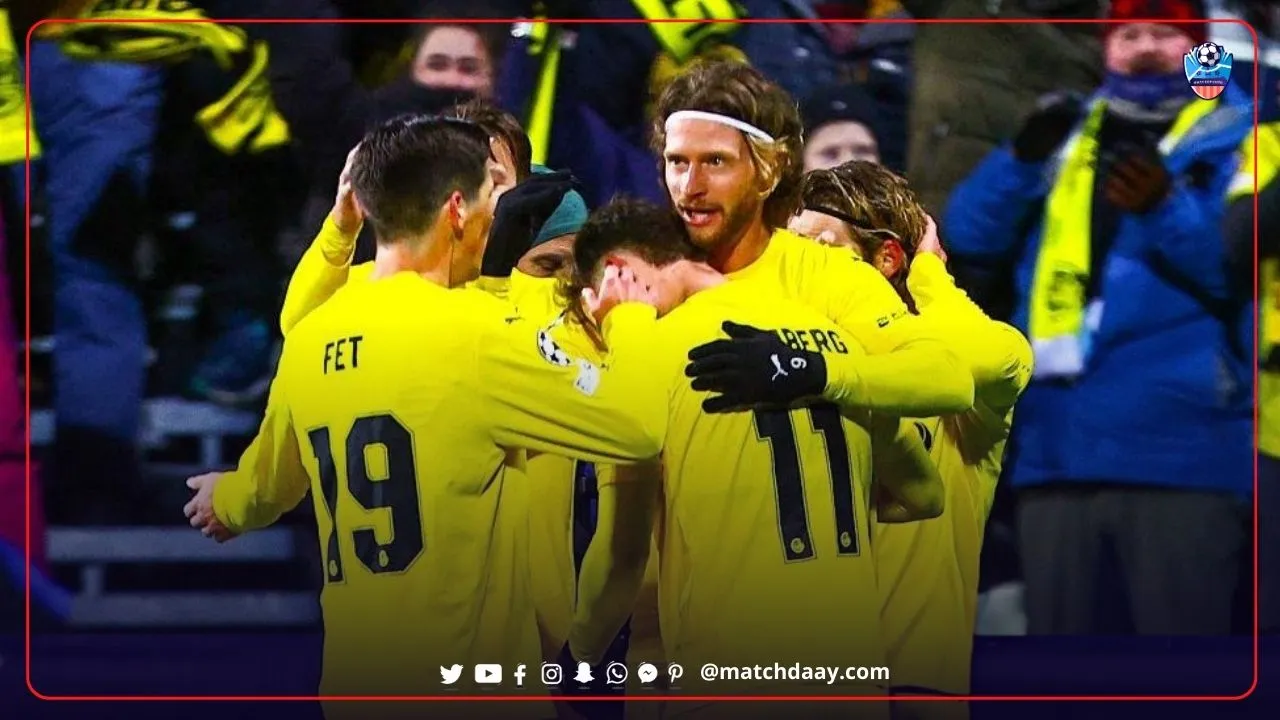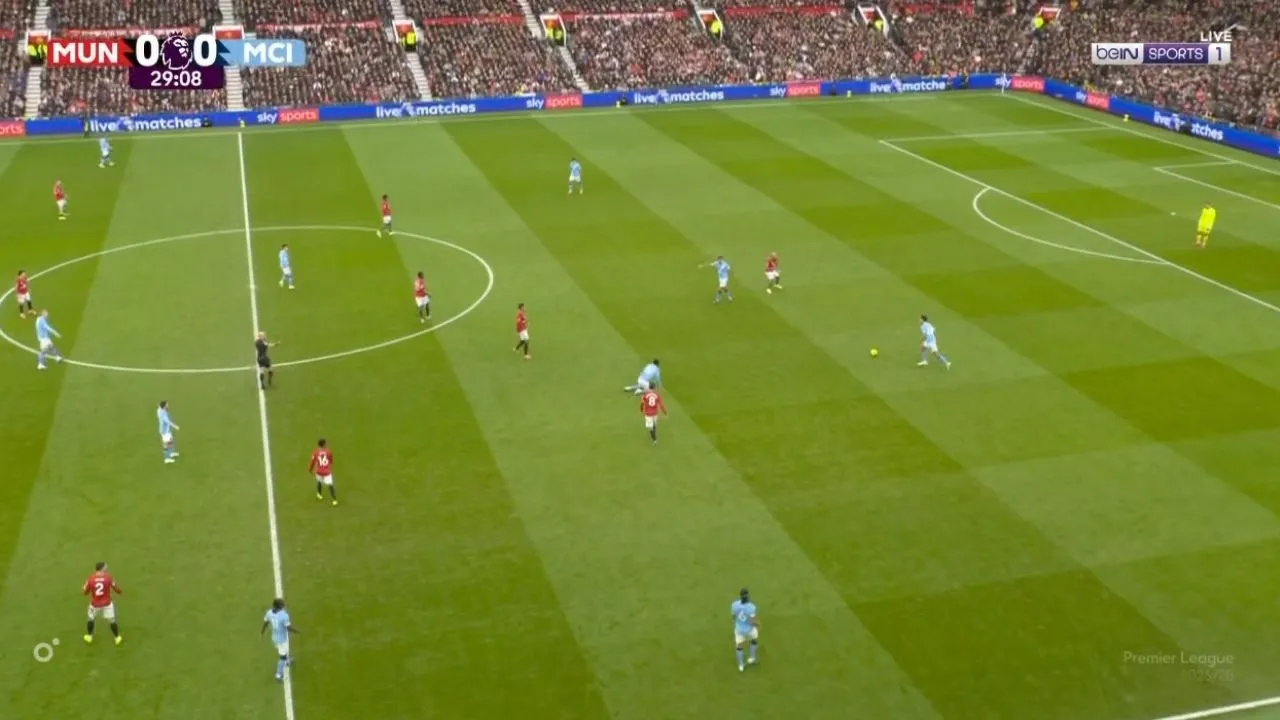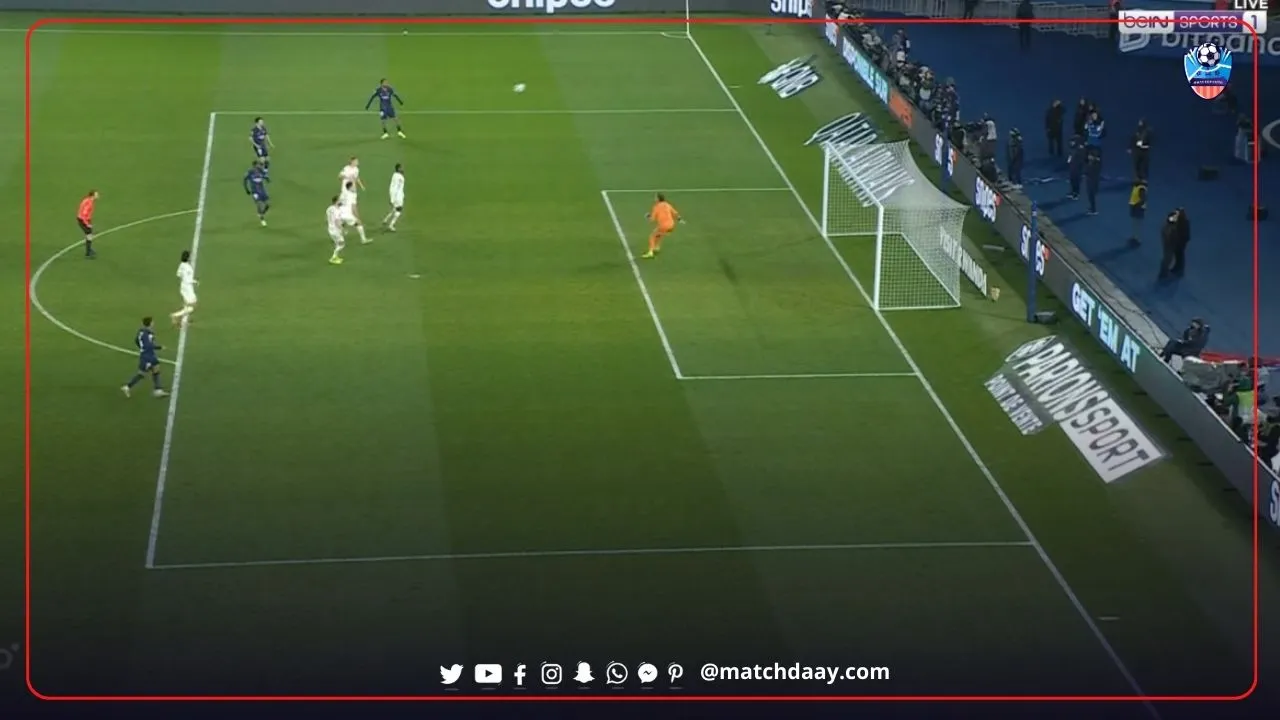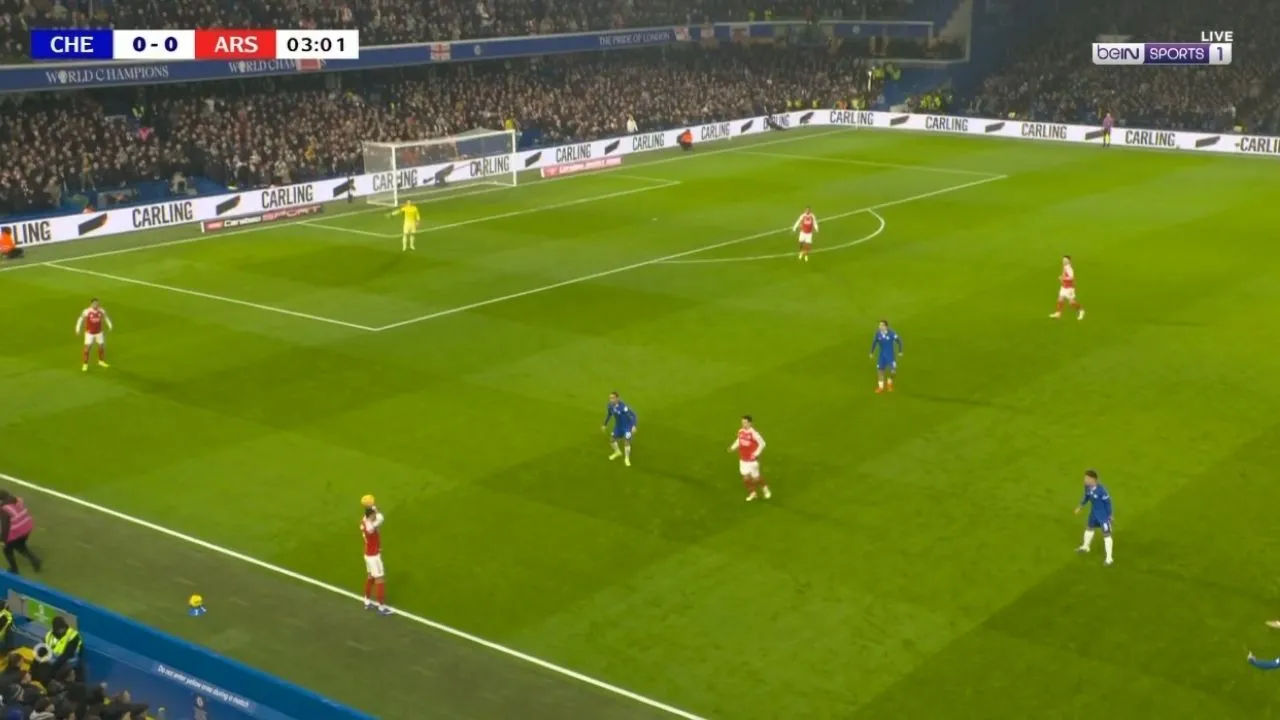 FIFA Club World Cup
FIFA Club World Cup Paris Saint Germain
Paris Saint Germain Bayern München
Bayern München- Info
- Lineups
- Stats
- Events
- Standings
| Date | July 5, 2025 |
|---|---|
| Time | 17:00 |
| League | FIFA Club World Cup |
| Status | FT |
Group D
| # | Team | P | W | D | L | Pts |
|---|---|---|---|---|---|---|
| 1 |
 Flamengo
Flamengo | 3 | 2 | 1 | 0 | 7 |
| 2 |
 Chelsea
Chelsea | 3 | 2 | 0 | 1 | 6 |
| 3 |
 ES Tunis
ES Tunis | 3 | 1 | 0 | 2 | 3 |
| 4 |
 Los Angeles FC
Los Angeles FC | 3 | 0 | 1 | 2 | 1 |
Group G
| # | Team | P | W | D | L | Pts |
|---|---|---|---|---|---|---|
| 1 |
 Manchester City
Manchester City | 3 | 3 | 0 | 0 | 9 |
| 2 |
 Juventus
Juventus | 3 | 2 | 0 | 1 | 6 |
| 3 |
 Al Ain
Al Ain | 3 | 1 | 0 | 2 | 3 |
| 4 |
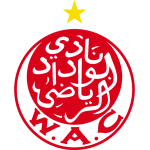 Wydad AC
Wydad AC | 3 | 0 | 0 | 3 | 0 |
Group B
| # | Team | P | W | D | L | Pts |
|---|---|---|---|---|---|---|
| 1 |
 Paris Saint Germain
Paris Saint Germain | 3 | 2 | 0 | 1 | 6 |
| 2 |
 Botafogo
Botafogo | 3 | 2 | 0 | 1 | 6 |
| 3 |
 Atletico Madrid
Atletico Madrid | 3 | 2 | 0 | 1 | 6 |
| 4 |
 Seattle Sounders
Seattle Sounders | 3 | 0 | 0 | 3 | 0 |
Group A
| # | Team | P | W | D | L | Pts |
|---|---|---|---|---|---|---|
| 1 |
 Palmeiras
Palmeiras | 3 | 1 | 2 | 0 | 5 |
| 2 |
 Inter Miami
Inter Miami | 3 | 1 | 2 | 0 | 5 |
| 3 |
 FC Porto
FC Porto | 3 | 0 | 2 | 1 | 2 |
| 4 |
 Al Ahly
Al Ahly | 3 | 0 | 2 | 1 | 2 |
Group F
| # | Team | P | W | D | L | Pts |
|---|---|---|---|---|---|---|
| 1 |
 Borussia Dortmund
Borussia Dortmund | 3 | 2 | 1 | 0 | 7 |
| 2 |
 Fluminense
Fluminense | 3 | 1 | 2 | 0 | 5 |
| 3 |
 Mamelodi Sundowns
Mamelodi Sundowns | 3 | 1 | 1 | 1 | 4 |
| 4 |
 Ulsan Hyundai FC
Ulsan Hyundai FC | 3 | 0 | 0 | 3 | 0 |
Group C
| # | Team | P | W | D | L | Pts |
|---|---|---|---|---|---|---|
| 1 |
 Benfica
Benfica | 3 | 2 | 1 | 0 | 7 |
| 2 |
 Bayern München
Bayern München | 3 | 2 | 0 | 1 | 6 |
| 3 |
 Boca Juniors
Boca Juniors | 3 | 0 | 2 | 1 | 2 |
| 4 |
 Auckland City
Auckland City | 3 | 0 | 1 | 2 | 1 |
Group E
| # | Team | P | W | D | L | Pts |
|---|---|---|---|---|---|---|
| 1 |
 Inter
Inter | 3 | 2 | 1 | 0 | 7 |
| 2 |
 Monterrey
Monterrey | 3 | 1 | 2 | 0 | 5 |
| 3 |
 River Plate
River Plate | 3 | 1 | 1 | 1 | 4 |
| 4 |
 Urawa
Urawa | 3 | 0 | 0 | 3 | 0 |
Group H
| # | Team | P | W | D | L | Pts |
|---|---|---|---|---|---|---|
| 1 |
 Real Madrid
Real Madrid | 3 | 2 | 1 | 0 | 7 |
| 2 |
 Al-Hilal Saudi FC
Al-Hilal Saudi FC | 3 | 1 | 2 | 0 | 5 |
| 3 |
 Red Bull Salzburg
Red Bull Salzburg | 3 | 1 | 1 | 1 | 4 |
| 4 |
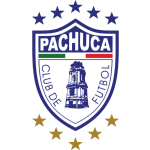 Pachuca
Pachuca | 3 | 0 | 0 | 3 | 0 |
The highly anticipated FIFA Club World Cup 2025 has reached its quarter-final stage, setting the scene for a monumental clash between two of European football’s most formidable institutions: PSG vs Bayern Munchen. This encounter is not merely another fixture in a tournament; it represents a pivotal moment in the inaugural expanded Club World Cup, bringing together 32 of the world’s elite clubs. The global footballing community eagerly awaits this colossal confrontation, which promises a display of exceptional skill, intense drama, and a fierce battle for supremacy on a grand, new international platform.
While the FIFA Club World Cup provides a fresh stage for this rivalry, the underlying intensity that has defined previous encounters between these two powerhouses remains undiminished. Their rivalry, forged in the crucible of UEFA Champions League battles, is so deeply ingrained that the specific tournament context becomes secondary to the inherent drive to overcome a direct, elite adversary. This suggests that both teams will approach the match with the gravitas typically reserved for a major continental final, elevating the psychological stakes beyond mere progression in the competition. It transforms the match into a battle for bragging rights and a definitive statement of continued dominance in European, and now global, club football. Furthermore, both clubs are profoundly motivated by the ambition to claim the inaugural expanded FIFA Club World Cup title [User Query]. Being the first club to lift this revamped trophy, a “historic edition” as it has been termed , carries immense prestige and secures a unique place in football history. The psychological boost for the victor will be substantial, potentially setting a benchmark for future editions of the expanded Club World Cup. This pursuit of a unique historical distinction is expected to contribute to a fiercely contested match.
#FIFACWC Quarter-Finals. 🔜#CWC2025 pic.twitter.com/D8teRKXUIq
— Match Spoots (@matchspoots) July 2, 2025
Match Essentials: Date, Time, Venue & How to Watch
For fans eager to follow every moment of this much-anticipated quarter-final, the crucial logistical details are as follows. The clash between PSG and Bayern Munich is scheduled for Saturday, July 5, 2025. Kick-off is set for
5:00 PM +01 (local time in Atlanta) [User Query]. For viewers in the United States, this translates to 12:00 PM ET, while European fans can tune in at 18:00 (Paris) | 18:00 (Munich).
The magnificent Mercedes-Benz Stadium in Atlanta, United States, will serve as the battleground for this thrilling contest. This state-of-the-art venue, home to Major League Soccer’s Atlanta United and the NFL’s Atlanta Falcons, boasts impressive features, including a retractable roof and a 360-degree halo video display, promising an immersive viewing experience for attendees. The selection of such a modern, technologically advanced venue with a proven track record of hosting major sporting events, including Super Bowls, the MLS All-Star Game, and upcoming FIFA World Cup 26 fixtures, including a semi-final, is a deliberate strategic decision by FIFA. This choice immediately elevates the perception of the Club World Cup as a premium event, aligning it with other top-tier global sports spectacles and contributing to the “colossal encounter” atmosphere. It signals FIFA’s commitment to presenting the tournament on a world-class stage, aiming to maximize fan engagement and media attention, particularly within the crucial US market.
Fans across the globe will have ample opportunities to catch every moment of this match. In the United States, the game will be broadcast live on TNT and available for streaming via DAZN. Crucially,
DAZN, the world’s largest sports streaming platform, is the global home of the FIFA Club World Cup 2025™, ensuring all 63 matches are live-streamed free to view worldwide. This “historic broadcasting deal” is a bold strategic move in an era dominated by subscription models, as it removes a significant barrier to entry for potential viewers. By prioritizing accessibility, FIFA and DAZN aim to rapidly build a massive global audience for the inaugural expanded Club World Cup, establishing its presence and importance. This could also serve as a long-term strategy for DAZN to introduce its platform to millions of new users, with the potential for a percentage to convert to paid subscribers for other sports content after experiencing the tournament. DAZN is widely accessible on all connected devices, including smart TVs, smartphones, tablets, and game consoles. FIFA’s official channels and the FIFA Match Centre will also provide live updates, detailed statistics, and in-depth analysis [User Query]. For those wishing to attend, tickets are available through FIFA’s official ticket partner, Ticketmaster, with options for individual matches or conditional games.
A Storied Rivalry Renewed: Head-to-Head History
The rivalry between Paris Saint-Germain and Bayern Munich has blossomed into one of modern football’s most captivating narratives, especially in the high-stakes environment of the UEFA Champions League [User Query]. This compelling history adds an extra layer of intrigue and intensity to the upcoming FIFA Club World Cup quarter-final.
Historically, Bayern Munich has held a notable edge in their head-to-head encounters. Across 14 previous meetings, Bayern has secured 8 wins, while PSG has claimed 6 [User Query]. This dominance is even more pronounced in recent history: Bayern has won five of their last six matches against PSG, including crucial Champions League encounters [User Query]. Notably, Bayern has also kept clean sheets in their last four victories against PSG, showcasing their defensive solidity when facing their Parisian rivals. Their most recent meeting occurred in the 2024/25 Champions League league phase, where
Bayern recorded a 1-0 win over PSG, with Minjae Kim scoring the decisive goal. Other significant recent clashes include Bayern’s 1-0 and 2-0 victories over PSG in the 2023 Champions League Round of 16 , and their triumph over PSG in the 2019/20 Champions League final.
The statistical dominance of Bayern in these encounters indicates a deep-seated psychological advantage. Bayern has consistently found ways to overcome PSG in high-pressure European matches. This historical record means Bayern approaches the upcoming match with inherent confidence, while PSG carries the burden of reversing a recurring pattern. This could lead Bayern to adopt an assertive, front-foot approach, potentially dictating the early tempo. For PSG, this historical hurdle presents a dual challenge: they must not only win the match but also overcome a psychological barrier. This could manifest as a heightened sense of determination, pushing them to perform beyond expectations, or, conversely, a tendency to play with added pressure, potentially leading to errors. The narrative of “redemption” for PSG against their historical tormentors adds significant emotional weight to this quarter-final.
Furthermore, PSG enters this tournament as the reigning UEFA Champions League winners , a monumental achievement marking their first UCL title. However, the data also reveals that Bayern defeated PSG 1-0 in the 2024/25 Champions League league phase. This means PSG secured the Champions League title without directly overcoming Bayern in the knockout stages. This dynamic suggests that Bayern might harbor a subtle feeling of “what if” or a desire to prove their superiority, having beaten PSG earlier in the UCL campaign despite PSG ultimately lifting the trophy. This could fuel Bayern’s motivation to assert their dominance on a global stage against a team they have historically controlled, making them exceptionally dangerous. For PSG, winning this Club World Cup quarter-final against Bayern would serve as a powerful validation of their European crown, demonstrating their ability to overcome a familiar, formidable rival they did not face in the UCL final itself. It transforms the match into a contest for undisputed continental bragging rights, now on a global stage.
Road to the Quarter-Finals: Form and Momentum
Assessing the current form and momentum of both teams is crucial in anticipating the dynamics of this quarter-final. Both Paris Saint-Germain and Bayern Munich arrive in Atlanta following successful domestic campaigns and varied, yet impressive, journeys through the FIFA Club World Cup.
Paris Saint-Germain’s Journey: European Champions on a Global Stage
PSG enters this tournament on the back of an historically successful 2024-25 season, having achieved a remarkable quadruple, securing the Ligue 1 title, Coupe de France, Trophée des Champions, and their inaugural UEFA Champions League crown. Their Champions League final victory was a resounding
5-0 triumph over Inter Milan, showcasing their formidable attacking prowess. In the FIFA Club World Cup, PSG navigated their group stage with impressive performances [User Query]. They delivered commanding victories, including a
4-0 thrashing of Inter Miami in the Round of 16 and an earlier
4-0 win over Atlético de Madrid in the group stage. They also secured a 2-0 victory over Seattle Sounders.
However, their journey was not without a surprising stumble: a shock 1-0 loss to Brazilian club Botafogo in group play, described as the “biggest shock of the tournament so far”. This setback, while not derailing their progression, served as a crucial wake-up call, demonstrating that even a team of their caliber can be stifled and defeated, especially in a new tournament format with diverse opposition. This “humbling” moment might serve as a psychological reset, sharpening their focus and eliminating any lingering complacency, potentially making them more dangerous. Excluding the Botafogo loss, PSG has accumulated a dominant 10-0 aggregate score across their three other Club World Cup victories, underscoring their offensive capabilities. Despite complaints from European powerhouses about the demanding schedule, PSG is taking the 32-team competition seriously, driven by the ambition to add another historic trophy.
Bayern Munich’s Path: Bundesliga Kings Eyeing World Domination
Bayern Munich also enjoyed a successful 2024-25 season, reclaiming their Bundesliga throne with a commanding performance, finishing with 82 points, 25 wins, and a league-best +67 goal difference. They scored an impressive 99 goals in the league while conceding 32, both top marks. Their Champions League campaign saw them exit at the quarter-final stage for the fourth time in five seasons, indicating a slight underperformance in Europe despite domestic success.
In the Club World Cup, Bayern demonstrated their dominance from the outset [User Query]. They opened their campaign with a massive 10-0 victory over Auckland City , showcasing their attacking firepower. They followed this with a hard-fought
2-1 win against Boca Juniors. Similar to PSG, Bayern also experienced a group stage loss, a
1-0 defeat to Benfica, though reports indicate they “rotated heavily for that game,” suggesting it was not a full-strength performance. In the Round of 16, Bayern secured a decisive
4-2 victory against CR Flamengo, with star striker Harry Kane bagging a brace. Bayern is currently the
highest scorer in the Club World Cup with 16 goals to their name, highlighting their potent attack.
Despite their offensive prowess, Bayern has shown susceptibility at the back, conceding “too many unnecessary goals” in the Bundesliga. In the Club World Cup, they conceded twice against Flamengo in their 4-2 win and needed a late goal to secure a 2-1 victory against Boca Juniors , suggesting defensive vulnerabilities that PSG’s attack could exploit. This creates a fascinating dynamic for the quarter-final: Bayern’s attack is undeniably potent and capable of breaching any defense, but their tendency to concede, even against non-European opposition, suggests that PSG’s electrifying and diverse attack will likely find openings. This sets the stage for a potentially high-scoring affair, where the team that can either minimize its defensive lapses or demonstrate superior clinical finishing will likely emerge victorious.
An often-overlooked factor is the unseen impact of player workload and cumulative fatigue. The UNFP (French players’ union) has voiced concerns about the Club World Cup’s timing at the end of an “already exhausting season,” infringing on players’ statutory rest periods. Key PSG players, for instance, transitioned directly from Champions League glory to national team duties, then immediately to the Club World Cup. While PSG’s squad depth is generally praised , the cumulative fatigue from a quadruple-winning season and immediate entry into a new major tournament could be a subtle yet significant underlying factor. This might not manifest as overt injuries but could impact player sharpness, decision-making, and endurance, particularly in the latter stages of a high-intensity knockout match, or if the game extends to extra time. Bayern, having exited the Champions League earlier , might be comparatively fresher or have managed their squad’s rest more effectively. This could provide a hidden, yet crucial, advantage for Bayern as the match wears on.
Tactical Battleground: Team News & Predicted Lineups
The tactical approaches of both managers will be heavily influenced by the availability and fitness of their key players. An examination of the team news and potential starting lineups provides crucial insights into the likely strategic battle.
Key Absences and Crucial Returns for Bayern Munich
Bayern Munich faces several significant challenges heading into this quarter-final. Leroy Sané is a confirmed absence, having completed his transfer to Galatasaray and officially no longer with the club. His departure impacts Bayern’s wide attacking options. Additionally, the dynamic left-back
Alphonso Davies is a major blow, as he is out until December due to a torn cruciate ligament.
Hiroki Ito will also not be fit until just after the tournament.
Kingsley Coman remains doubtful due to a knock sustained in the Round of 16 match against Flamengo, which could further impact Bayern’s attacking depth on the wings.
Despite these key absences, Bayern boasts a deep squad, and manager Vincent Kompany is known for his ability to find suitable replacements and adapt his tactical approach. A major boost for Bayern is the return of
Jamal Musiala, who suffered a knock against Boca Juniors but has since returned to full team training and made a substitute appearance against Flamengo, indicating his readiness for a more prominent role.
Minjae Kim was also present in full team training, working his way back from an Achilles issue.
PSG’s Squad Strength and Key Player Updates
For Paris Saint-Germain, the team appears to be largely free from major injury concerns heading into this quarter-final [User Query]. Manager Luis Enrique will likely have a full complement of his star players available, allowing him to field his strongest possible lineup, which is crucial for such a high-stakes match [User Query].
A crucial point of clarification regarding PSG’s lineup: while the initial query’s predicted lineup included Kylian Mbappé, multiple reliable sources confirm that Kylian Mbappé left PSG to join Real Madrid on July 1, 2024. This marks PSG’s “first season since 2016–17 without record goalscorer Kylian Mbappé”. His inclusion in PSG’s predicted lineup in the initial query is therefore factually incorrect and has been rectified in the following analysis. The significant observation here is that PSG
still achieved a historic quadruple, including their first Champions League title, without their former record goalscorer. This signifies a fundamental shift in PSG’s identity. They are no longer a team solely reliant on Mbappé’s individual genius but have evolved into a more cohesive, tactically robust unit under Luis Enrique. The attacking threat is now more distributed among players like Dembélé, Kvaratskhelia, Doué, and Neves, making PSG potentially less predictable and more challenging to defend against.
Other key player updates for PSG include Ousmane Dembélé, who made his first tournament appearance as a substitute against Inter Miami after recovering from a left quadriceps injury and is now in contention to start against Bayern.
João Neves has been a standout performer, scoring a brace against Inter Miami.
Désiré Doué is another key player who featured for France prior to the Club World Cup. The defense features
Willian Pacho, formerly of Eintracht Frankfurt, and Lucas Hernández, an ex-Bayern defender, adding an intriguing layer of familiarity.
PSG vs Bayern Munchen: Predicted Starting Lineups
Forecasting the starting XIs for such a high-profile match is always challenging, as final decisions rest with the coaching staff based on last-minute fitness, tactical considerations, and opponent analysis. This inherent uncertainty means that these are the most probable formations based on current information, but they remain subject to change until official announcements.
| Position | Bayern Munich (4-2-3-1) | Paris Saint-Germain (4-3-3) |
| Goalkeeper | Manuel Neuer | Gianluigi Donnarumma |
| Defenders | Noussair Mazraoui | Achraf Hakimi |
| Dayot Upamecano | Marquinhos | |
| Matthijs de Ligt | Willian Pacho | |
| Josip Stanišić | Nuno Mendes | |
| Midfielders | Joshua Kimmich | João Neves |
| Leon Goretzka | Vitinha | |
| Jamal Musiala | Fabián Ruiz | |
| Forwards | Michael Olise | Ousmane Dembélé |
| Serge Gnabry | Désiré Doué | |
| Harry Kane | Khvicha Kvaratskhelia |
The Deciding Factors: Strengths, Weaknesses & Player Matchups
The core strengths and weaknesses of both PSG and Bayern Munich, combined with key individual player matchups, will largely determine the outcome of this quarter-final.
PSG’s Attacking Prowess vs. Bayern’s Structured Might: PSG is renowned for their attacking flair, electrifying pace, and individual brilliance, with dangerous players capable of turning a game on its head [User Query]. Under Luis Enrique, they have developed into a “magnificent” side, capable of hammering opponents as seen in their 4-0 wins over Inter Miami and Atlético Madrid. Their attack, now less reliant on a single superstar, features dynamic players like Ousmane Dembélé, Khvicha Kvaratskhelia, Désiré Doué, and the goal-scoring João Neves, offering diverse threats.
Bayern, conversely, is known for their structured approach, potent finishing, and relentless attacking pressure [User Query]. They are the highest scorers in the Club World Cup with 16 goals , demonstrating their offensive firepower, including a 10-0 thrashing of Auckland City. Their attack is led by the prolific Harry Kane, who scored 26 league goals in 2024-25 and has three Club World Cup goals. He is strongly supported by the outstanding Michael Olise, who was the Bundesliga Player of the Season with 12 goals and 15 assists and also has three Club World Cup goals , and the returning Jamal Musiala, who also has three Club World Cup goals.
The offensive strategy of Bayern often revolves around the clinical finishing and hold-up play of Harry Kane, who is a proven goal machine. PSG, in the post-Mbappé era, has shifted to a more fluid, distributed attack, with players like Dembélé, Kvaratskhelia, and Doué creating chaos through pace and individual skill from various angles. This sets up a classic tactical clash: a singular, dominant striker against a multi-pronged, unpredictable offensive unit. Bayern will likely focus on providing service to Kane, using their structured build-up and wide players to create crossing opportunities or through balls. PSG, conversely, will aim to disorganize Bayern’s defense with rapid transitions, intricate passing, and unpredictable movements from their diverse attacking personnel. The success of PSG’s defense in neutralizing Kane, and Bayern’s defense in containing PSG’s varied attacking threats, will be paramount. This contrast in offensive philosophies promises a fascinating tactical battle and could lead to a highly dynamic, end-to-end game.
Midfield Battles and Defensive Resilience: The central midfield duel will be paramount: Bayern’s Joshua Kimmich and Leon Goretzka against PSG’s João Neves, Vitinha, and Fabián Ruiz. Control of this area will dictate tempo, possession, and the supply lines to the dangerous forwards. Bayern’s defensive line, likely featuring Upamecano and de Ligt, will face a stern test from PSG’s fluid attacking movements and electrifying pace. PSG’s defense, anchored by Marquinhos, will need to be highly organized and disciplined to contain Harry Kane’s predatory finishing and Bayern’s structured attacks.
Despite winning the Bundesliga and having the statistically best defense , Bayern has shown a susceptibility to conceding “unnecessary goals” and has shipped two goals against Flamengo and struggled against Boca Juniors in the Club World Cup. This indicates that their defensive solidity is not absolute, especially under pressure from dynamic attacks. Vincent Kompany will be acutely aware of these defensive frailties when facing PSG’s potent attack. This could lead him to adopt a slightly more cautious approach than usual, perhaps emphasizing defensive shape and counter-pressing to prevent PSG from building momentum. Alternatively, he might stick to his high-intensity, attacking philosophy, banking on his team’s superior firepower to simply outscore PSG. The match will be a significant test of Kompany’s tactical acumen and his ability to balance offensive ambition with defensive stability against an elite opponent.
Key Player Matchups to Watch:
- Harry Kane vs. Marquinhos/Willian Pacho: The battle between Bayern’s prolific striker and PSG’s central defensive partnership will be a defining contest.
- Ousmane Dembélé/Khvicha Kvaratskhelia vs. Bayern’s Fullbacks (Mazraoui/Stanišić): The pace, dribbling, and trickery of PSG’s wingers against Bayern’s defensive wide players will be crucial for creating chances.
- Joshua Kimmich vs. João Neves/Vitinha: The control and distribution in midfield, dictating the flow of the game, will largely depend on these key orchestrators.
- Manuel Neuer vs. Gianluigi Donnarumma: Both are world-class goalkeepers, and individual moments of brilliance or errors from either could prove decisive in such a tightly contested affair.
This match is more than just a quarter-final; it is a potential statement [User Query]. Both clubs are driven by the ambition to claim the inaugural expanded FIFA Club World Cup title. This transcends mere progression in a tournament; it is about establishing global dominance and setting a precedent in a new era of club football. This underlying motivation could push both teams to their absolute limits, resulting in a truly classic and memorable encounter that goes down in history.
Expert Prediction: Who Will Advance?
Synthesizing the extensive analysis of historical data, current form, team news, and tactical considerations leads to a nuanced prediction for the outcome of this colossal quarter-final.
Bayern’s Advantages: Bayern holds a significant psychological edge with a superior head-to-head record against PSG, having won 5 of their last 6 encounters, including 4 consecutive with clean sheets. This historical upper hand is a tangible factor. Their attack is exceptionally potent, as evidenced by their status as the highest scorers in the Club World Cup with 16 goals , spearheaded by the in-form Harry Kane and Michael Olise. The return of Jamal Musiala further bolsters their offensive options. Despite key absences like Sané and Davies, Bayern’s deep squad allows for quality replacements, maintaining competitive integrity.
PSG’s Advantages: PSG enters as reigning UEFA Champions League holders and quadruple winners from the 2024-25 season, signifying a team at the peak of its powers and brimming with confidence. The team has successfully transitioned from over-reliance on a single star to a more cohesive, tactically robust unit under Luis Enrique, with a distributed attacking threat. They are largely free from major injury concerns, allowing Luis Enrique to field his strongest possible lineup [User Query]. Furthermore, a strong desire to conquer the inaugural expanded FIFA Club World Cup title and reverse their historical trend against Bayern will be a powerful motivator.
Balancing Factors: Both teams possess immense attacking flair and a wealth of dangerous players capable of turning the game on its head [User Query]. Bayern’s structured approach and potent finishing will test PSG’s defensive solidity. Meanwhile, PSG’s electrifying pace and individual brilliance will look to exploit any weaknesses in Bayern’s backline [User Query]. Both sides have shown minor defensive vulnerabilities in the tournament so far—Bayern conceding against Flamengo, and PSG experiencing a shock loss to Botafogo—suggesting a high-scoring potential.
Predicted Scoreline and Outcome: Given the attacking prowess on display and the slight defensive frailties of both sides, a tightly contested affair, highly likely featuring goals from both sides, is anticipated [User Query]. Predicting the exact scoreline is challenging, but a narrow victory for either side, or even a high-scoring draw leading to extra time, seems plausible, reflecting the evenly matched nature of these giants [User Query].
The prediction of a 2-2 draw in regulation time is a direct consequence of the identified strengths and weaknesses. Both teams possess elite attacking talent and have demonstrated prolific goal-scoring in the tournament. Simultaneously, both have shown defensive lapses, suggesting a game where neither defense is likely to completely shut down the opposition. This points to an open, entertaining, and end-to-end encounter where tactical discipline might occasionally yield to offensive ambition. The draw outcome underscores the near-perfect balance in quality and the shared tendency to both create and concede chances, making it a true spectacle for the neutral fan.
The specific addition that Bayern is expected to win after extra time or penalties is crucial. It implies that while the teams are evenly matched over 90 minutes, Bayern possesses a subtle advantage in the high-pressure, decisive moments of knockout football. This can be attributed to their superior head-to-head record against PSG , which might provide a psychological edge in prolonged contests. Furthermore, their consistent presence in the deep stages of European competitions, combined with a more seasoned mentality and composure in high-stakes scenarios, could be the subtle difference that pushes them over the line when the game extends beyond regulation time. It highlights that beyond talent and form, the intangible qualities of composure and big-game experience in prolonged battles will be the ultimate deciding factors.
Our Prediction: PSG 2 – 2 Bayern Munich (Bayern to win after extra time or penalties)
A Spectacle Awaiting Football Fans
In closing, the PSG vs. Bayern Munich quarter-final is poised to be a defining moment of the inaugural expanded FIFA Club World Cup 2025. It is a clash that transcends mere football, embodying a renewed rivalry between two of Europe’s most formidable clubs vying for global supremacy on a new, historic stage. With both teams boasting immense attacking talent, coupled with their respective strengths and subtle vulnerabilities, this encounter promises to be a thrilling, high-scoring affair. The historical narrative, coupled with the ambition to claim the first expanded Club World Cup title, guarantees an intensity rarely seen outside of a major final. Football fans worldwide are urged not to miss a single moment of this captivating contest at the Mercedes-Benz Stadium in Atlanta. It is set to be a true footballing spectacle, a testament to the beautiful game at its highest level, and a match that will undoubtedly be etched into the history of the FIFA Club World Cup.
